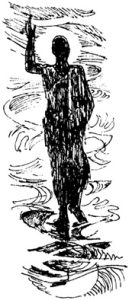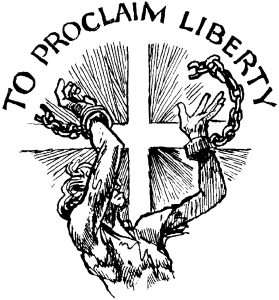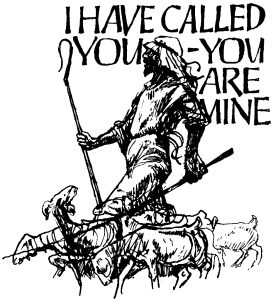Daniel 7:1-3,15-18, Luke 6:20-31
In the name of the Father, the Son and The Holy Spirit, Amen
 Every other year in the week day lectionary I use for morning prayer, November starts (as it does on Tuesday) with the daily Bible readings shifting to Revelation and Daniel…. It all gets a bit out there and full of very graphic visions. Both of these books are at the apocalyptic end of the spectrum. They contain deeper messages, stories, and visions – written in a kind of code that was understood by the people they were intended for (but not by the authorities!) and not easily by us two thousand or so years later. Even though one is in the Old Testament and another in the new, they are written or edited in times that are reasonably proximate to each other.
Every other year in the week day lectionary I use for morning prayer, November starts (as it does on Tuesday) with the daily Bible readings shifting to Revelation and Daniel…. It all gets a bit out there and full of very graphic visions. Both of these books are at the apocalyptic end of the spectrum. They contain deeper messages, stories, and visions – written in a kind of code that was understood by the people they were intended for (but not by the authorities!) and not easily by us two thousand or so years later. Even though one is in the Old Testament and another in the new, they are written or edited in times that are reasonably proximate to each other.
All of which makes them a challenging read and this morning we got a bit of Daniel – as he is tipping into his most visionary in the second half of his book. Our knowledge of the book of Daniel, may well be restricted to somewhat hazy recollections of the Lion’s den, fiery furnace and maybe the writing on the wall! which all feature in the early part before the passage we heard today. Or in this church particularly, the story of St Michael as the warrior angel in the second section of the book after the reading we had today.
On top of all of that and our passage from Daniel this morning has the added benefit of having 2 short sections (with 12 verses missed out) in between – so we only get a taste of what Daniel’s vision was about! I was almost tempted to have the whole reading this morning, but decided in the end it was all abit x-rated horror movie stuff (and there is much to much glorifying of that in our inherited hallow’een traditions – which personally I dislike with a passion!).
Anyway back to Daniel’s vision, it speaks into a chaotic time for the Jewish people. (We feel their pain through our own chaotic recent times). The Greek King Antiochus Epiphanes the 4th was a tyrant over them. There was a rebellion and uncertainty and great fear gripped the nation. This was represented in Daniel’s vision as the four beasts coming from the sea (that alone in these times was picture language representing chaos and powerlessness). As I said we live in pretty chaotic and uncertain times too and could easily dream of beasts that are frightening us. I could give them a few names if that helps
War particularly nuclear war, the impacts of climate change (heat, drought, flood etc), inflation and fuel prices, pandemics, issues with global food supply, maybe even the kind of leadership we have been experiencing so far from truth and the common good.
Daniel’s beasts represent what was frightening him at the time and they did sound pretty scary if you read the whole passage, especially the last one! But before we get to the second part of the passage we heard, two other things are described. A vision of God on the heavenly throne and the worst of the beasts being destroyed and then the coming of a human being given dominion, glory and kingship. If this is sounding vaguely familiar, this is a reading that often is used on Ascension Day. It describes That all peoples, nations and languages should serve him. His dominion is an everlasting dominion that shall not pass away and his kingship is one that shall never be destroyed.
All this is clearly about Jesus and what he accomplished for us. The kind of King Jesus is for us and the kind of kingdom he made for us – both in this life and the next. It is then that Daniel in his vision and in the second part of the reading we heard is approaching one of the attendants to get an explanation of his vision. My commentaries suggested there were some angelic qualities to the attendant as he owned disclosing an interpretation (as a messenger from God).
Despite the obvious power of the beasts in Daniel’s vision and the things that are frightening us in chaotic times, they are not an end. These things will arise clearly but the power of God is greater. Where our passage ends but the holy ones of the most high shall receive the kingdom. The holy ones being those following God’s way for them and the even better news is being in this kingdom is for us now and for us for ever and ever. This is how it links to all saints. The holy ones of the most high. Though we may tend to see saints as the very holy people we recall and remember who have gone before us – Holy ones. It is also quite legitimate to describe ourselves as the saints God has today And also his Holy ones of the most high. It is an understanding that the saints are to take forward the kingdom. The holy ones who have gone before us are a guide and inspiration for us and we are the holy ones that take it forward in our day. We also are to inspire the holy ones who will follow us and continue the journey of faith.
We have a perspective and a hope greater than the visionary beasts of Daniel’s worst nightmare and our own…. If we find this easier as holy ones, we occupy a space between the spiritual or liminal space between earth and heaven. Ours is a heavenward calling, exercising our faith in the calling God has for us and never losing sight of our glorious inheritance with all the saints who have gone before. Encouraging fellow saints along the way of God.
Two of the hymns we will sing later in this service both make this point in different ways
In for all the saints – the work of William Walsham How – a bishop in London’s east end – there is both looking back at great examples of faith, and us in our calling. We feebly struggle, they in glory shine, yet all are one in thee for all our thine. And in hearts that are brave again and arms that are strong.
I have been doing some digging recently into the war memorial window in Wincanton (more of this on Remembrance Sunday there). It contains very resurrection focussed imagery and Jesus putting the crown of gold on the head of a tommy. When it was blest and unveiled in 1920 for all the saints was sung. Echoing the imagery O may thy soldiers faithful, true and bold, fight as the saints who nobly fought of old and win with them the victor’s crown of gold.
In the last hymn we sing today – O when the saints go marching in. It is very much in the present tense. About our walk with God – echoing the saints in glory and our calling in the present…. One day we will sing to Father, Son and Holy Ghost more intimately with those who have gone before. Let’s use it in our present to inspire our hearts to serve Jesus in his kingdom today and every day.
AMEN
References
The New Revised Standard Version (Anglicized edition), 1989, 1995
Connections – A Lectionary Commentary for Preaching and Worship – Edited by Joel Green et al
CCLI – Song reproduced under CCLI 1618191 for St Michael’s Church, Pen Selwood


